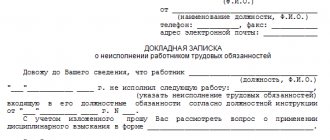Disciplinary sanctions are special measures of liability provided for persons found to have violated labor regulations adopted at an enterprise or institution. The legislation clearly regulates the methods of punishment and allows the use only of those provided for in the relevant articles of the Labor Code of the Russian Federation.
Who exactly imposes a disciplinary sanction on an employee directly for a sanitary offense? Let's figure it out.
Applying order
Among the responsibilities of the management of an institution or enterprise is the imposition of disciplinary sanctions on employees found to have committed a sanitary offense. In serious cases, they must exercise their right solely on the basis of a proposal issued by either the chief medical officer or his first deputy.
A penalty can only be imposed for a certain period - usually a month. The starting point is the day the offense was discovered. However, this period of time does not include:
- vacations;
- sick leave;
- periods required to obtain union consent.
In addition, disciplinary punishment cannot be used if:
- more than 6 months have passed since the violation of discipline;
- the fact was revealed during an inspection or audit 2 years later.
The time frame mentioned above should not include time spent on investigations carried out as part of criminal proceedings.
Administrative liability for violation of sanitary and epidemiological requirements
Citizens, individual entrepreneurs, legal entities, as well as officials obliged to comply with sanitary and epidemiological requirements, if they are violated, may be subject to administrative punishment. The general rule on liability for failure to comply with sanitary requirements or failure to comply with mandatory standards is contained in Art.
6.3. Code of Administrative Offenses of the Russian Federation.
The article provides for punishment in the form of a warning, fine or suspension of activities for up to 90 days. The period of suspension of activities may be reduced after the elimination of the violations for which, in fact, the person was held accountable.
READ Complaint against a doctor to the Ministry of Health: sample 2021, where to complain, how to file a complaint
For certain types of offenses associated with an increased threat to human health, the legislator has developed special norms. These include violations of mandatory requirements:
- operation of residential premises, structures and transport;
- to drinking water;
- to the conditions of education, training, and health improvement of children.
When considering administrative cases for persons who have violated sanitary standards, it is important to remember that the presence of guilt alone is not a reason for prosecution. A person is subject to administrative punishment if he had the actual and legal opportunity to avoid the offense.
How a penalty is imposed - procedure
The decision on punishment is made by the head of the enterprise or organization. This is usually done on the basis of a report or a report received from the violator’s immediate superiors. The date of familiarization with these documents is the moment from which the statute of limitations is calculated.
In accordance with the procedure provided for by law, the administration is obliged to request written explanations from the employee. If the latter refuses, an act is drawn up recording this circumstance.
If an explanatory note is nevertheless submitted, then management has the right to make a final decision at its own discretion, depending on the reasons given in it. If the basis for the application of sanctions is the order of the chief medical officer, then his recommendation is followed.
Next, an order is drawn up, which clearly indicates what kind of penalty will be imposed.
Penalty for violation of sanitary legislation - types, legal norms
The Russian legal framework provides for significant sanctions for violation of sanitary legislation. Therefore, it is necessary to initially determine the measures of responsibility for committing such offenses and crimes. Thus, the types of penalties for violation of sanitary legislation may be as follows:
- A disciplinary sanction for a sanitary offense is imposed directly on the employee of the enterprise who is guilty of committing it. At the same time, the legislation strictly defines the list of permissible disciplinary sanctions in the regulations of the Labor Code.
- An administrative penalty can be imposed both on an individual employee and on an enterprise as a whole, and most often it is expressed in the form of a direct monetary administrative fine.
- Criminal penalties are intended exclusively for application to certain individuals guilty of violating sanitary legislation and are not applied to enterprises.
- Civil liability concerns issues of compensation for damage caused to injured persons due to sanitary violations.
From a legislative point of view, the above aspects of penalties are regulated by the following regulatory documents:
- Article 192 of the Labor Code of the Russian Federation defines specific existing types of disciplinary sanctions.
- Article 193 of the Labor Code of the Russian Federation considers the procedure according to which disciplinary sanctions should be imposed by employers in the Russian Federation.
- Article 6.3 of the Code of Administrative Offenses of the Russian Federation presupposes liability for violations of the general sanitary and epidemiological safety of the population.
- Article 6.4 of the Code of Administrative Offenses of the Russian Federation directly regulates violations of sanitary requirements regarding the procedure for the use and operation of premises or transport.
- Article 6.5 of the Code of Administrative Offenses of the Russian Federation is devoted to responsibility for ignoring legal requirements regarding drinking water.
- Article 6.6 of the Code of Administrative Offenses regulates the issues of punishment for inadequate provision of food to the population and epidemiological requirements for relevant institutions.
- Article 6.7 of the Code of Administrative Offenses of the Russian Federation considers issues related to ensuring sanitary safety in children's health, recreational or educational institutions.
- Article 8.2 of the Code of Administrative Offenses of the Russian Federation is devoted to issues of liability for improper waste management.
- Article 236 of the Criminal Code of the Russian Federation considers criminal punishment for violations of sanitary legislation if they entail consequences in the form of illness or death of a person.
Violations of requirements
For improper implementation of sanitary standards, the employer has the authority to reprimand orally or in documentary form and enter it in a personal file, make a reprimand or dismiss.
This is also important to know:
What is the warranty period for repair and construction work by law?
Civil punishment is punishment for damage caused to a person, property of an individual or legal entity in the field of sanitary standards. Damage must be compensated in accordance with the laws of Russia.
In situations of moral damage, compensation for damages is due. The amount of compensation for loss is decided by determining the level of guilt of the perpetrator.
Also taken into account is the information of the injured party: the levels of physical and psychological suffering suffered by the victim. The Code of Laws on administrative violations of Russia regulates the following list of offenses:
- failure to comply with legislative acts in the field of sanitary provision of the population, expressed in the form of failure to comply with hygiene standards, failure to perform preventive tasks;
- non-compliance with epidemiological tasks in relation to city and apartment buildings, city institutions, including transport;
- failure to comply with sanitary standards for drinking equipment and drinking water itself;
- failure to implement epidemiological measures in public catering establishments.
Penalties
Failure to comply with sanitary laws is subject to administrative punishment, which is characterized by the inspector making a remark or imposing an administrative fine in the amount of 110 to 3,000 rubles for individuals; from 6,000 to 200 thousand rubles for legal entities.
The inspector also has the right to stop the operation of the enterprise for up to 90 days. As for criminal punishment for failure to comply with epidemiological requirements, resulting in mass infection, in such a situation responsibility for the act comes into force, namely:
- punishment in the form of a fine in the amount of up to 90,000 rubles;
- deprivation of the right to work in a certain profession for up to three years;
- civil work lasting 190 hours;
- correctional measures lasting one year;
- limited mobility for up to three years.
Failure to comply with sanitary requirements, which resulted in the death of the population, is punishable in the form of civil labor for up to 250 hours, correctional labor for six months or three years.
This is also important to know:
What is a reprimand under the Labor Code of the Russian Federation and its types
In some situations, a sentence of restriction of movement or imprisonment of up to six years is imposed. Criminal punishment is regulated in such legislative articles of the Criminal Code of Russia as:
Free legal consultation We will answer your question in 5 minutes!
Ask a Question
Free legal consultation
We will answer your question in 5 minutes!
Ask a Question
- Article 238 - sale of goods, services and work that do not meet consumer health and life safety standards;
- Article 246 - failure to comply with sanitary requirements in the field of construction work;
- Article 247 - improper handling of bacteriological, toxic substances;
- Article 248 - failure to comply with safety precautions when working with microorganisms;
- Article 254 - improper use of fertilizers during agricultural work.
For these types of acts, the following forms of punishment are prescribed, depending on the degree of aggravating circumstances:
- penalties in the amount of up to 600,000 rubles or monthly payments deducted from wages for up to four years;
- a ban on working in a certain profession or for a specific type of work for up to four years;
- restricted movement for three years;
- a prison sentence lasting ten years, also in addition to the sentence, by a court decision, they will be ordered to pay the amount of fines or may be prohibited from working in a certain specialty for up to ten years;
- corrective measures up to three years;
- civil work lasting from 130 to 250 hours.
Who bears what responsibility for violating sanitary legislation?
In accordance with Art. 55 of Law No. 52-FZ establishes administrative, criminal and disciplinary liability for violation of sanitary legislation.
READ How long does it take to get a TIN at the tax office?
A significant part of sanitary regulations is addressed to employers, because their responsibilities include organizing a safe workplace for employees. By violating sanitary rules, the employer bears administrative liability (Chapter 6 of the Code of Administrative Offenses of the Russian Federation), and if there are consequences in the form of death or mass morbidity, then criminal liability (Art.
236 of the Criminal Code of the Russian Federation).
However, it is obvious that compliance with sanitary standards and rules depends not only on the employer, but also in many ways directly on the workers themselves. For example, the management of an enterprise with dangerous and harmful working conditions is obliged to provide workers with special clothing and other personal protective equipment (Article 221 of the Labor Code of the Russian Federation).
However, an employee may neglect the obligation to wear protective clothing, despite its availability. In this case, the employer bears the risk of administrative liability. What should you do with the employee in this case? Does the manager have the right to bring him to disciplinary liability? Let's figure it out further.
Other types of liability
The 52nd Federal Law, which defines measures to ensure the sanitary and epidemiological well-being of citizens, provides for liability for the offenses discussed in this material. Articles 27 to 31 are devoted, in particular, to this topic.
In the mentioned normative act, sanitary offenses include those that infringe on the rights of citizens and society as a whole. A more specific list is:
- failure to comply with anti-epidemiological and hygienic measures;
- non-compliance with sanitary legislation;
- ignoring SanPiN, orders and regulations issued by the relevant service.
This is interesting: Dismissal during vacation at your own request
There are also economic measures of influence.
Is it possible to bring disciplinary action for violating sanitary norms and rules?
Disciplinary liability is expressed in the fact that for committing disciplinary offenses, the employer has the right to impose disciplinary sanctions on employees (Article 192 of the Labor Code of the Russian Federation).
A disciplinary offense is considered to be the failure or improper performance by an employee of his assigned job duties. Such failure must necessarily be culpable.
If we talk about sanitary norms and rules, then according to Art. 214 of the Labor Code of the Russian Federation, an employee is obliged to:
- comply with labor protection requirements;
- correctly use protective equipment, such as protective clothing;
- immediately notify of any manifestations of ill health and accidents;
- undergo medical examinations in a timely manner;
- undergo training in safe work methods and techniques.
The employee’s specific job responsibilities, including compliance with sanitary standards and rules, must be recorded in the organization’s internal labor regulations, employment contract, job description, and orders of the manager. Accordingly, an employee can be brought to disciplinary liability for violations of sanitary norms and rules if he committed actions prohibited by the job description or did not perform the actions required of him.
Thus, it is possible to bring an employee to disciplinary liability only if the violated rule of conduct is specified in a local regulation, job description or employment contract. For example, if this employee is responsible for the availability of disinfectants, and Rospotrebnadzor fines the organization for their absence, the employee can be punished through disciplinary action.
In this case, the employer does not have the right to invent types of penalties, but must adhere to the list established by the Labor Code of the Russian Federation (Article 192 of the Labor Code of the Russian Federation):
- comment;
- rebuke;
- dismissal for some reason.
READ Alimony penalty: collection, late fees, judicial practice
For some categories of employees, additional types of penalties may be provided.
The penalty imposed by the employer must be proportionate to the offense committed. For example, dismissal will be excessive in the event of a one-time failure by an employee to fulfill the duty to disinfect work surfaces in a store, but a reprimand will be just right.
Note! Fines cannot be used as a disciplinary sanction.
Thus, when answering the question whether an employer can impose a disciplinary sanction on an employee for violations of sanitary legislation, it is necessary to first find out whether compliance with a specific rule is among the job responsibilities of this employee, whether it is spelled out in his job description or local regulations.
Expert opinion
Petrov Grigory Vladimirovich
Practicing lawyer with 6 years of experience. Specializes in criminal law. More than 3 years of experience in drafting contracts.
Recently, a new recommendation that has extended to almost all areas of activity has been the wearing of masks and gloves by workers. In some regions this is not a recommendation, but a requirement.
For example, in Moscow, by mayoral decree No. 12-UM dated March 5, 2020, citizens were required to use personal protective equipment, taking into account the specifics established by the employer (clause 1.4 of Appendix 6 to decree No. 12-UM).
The mask regime at the enterprise is organized by order of management by issuing an order, with which all employees must be familiarized and signed. In this case, refusal to wear a mask should be regarded as a disciplinary offense.
Note! Violation of sanitary norms and rules is not grounds for removing an employee from performing duties, since this is not provided for in Art. 76 Labor Code of the Russian Federation.










